ACA CINEMA PROJECT
FLASH FORWARD:
DEBUT WORKS AND RECENT FILMS BY NOTABLE JAPANESE DIRECTORS
December 3-23, 2021
Twenty-film program co-presented by Japan Society and the Agency for Cultural Affairs in association with Visual Industry Promotion Organization (VIPO).
Online film series celebrates six prominent Japanese filmmakers of today, pairing directorial debuts and recent films by Naomi Kawase, Miwa Nishikawa, Shuichi Okita, Junji Sakamoto, Akihiko Shiota and Masayuki Suo. Online selection of six breakout films by up-and-coming Japanese filmmakers.
In-theater focus on master director Sadao Yamanaka, featuring 4K restorations of Tange Sazen and the Pot Worth a Million Ryo, North American Premiere and Priest of Darkness, International Premiere curated by the National Film Archive of Japan.
New York, NY (November 4, 2021) – Japan Society and the Agency for Cultural Affairs, Government of Japan (ACA), in collaboration with the Visual Industry Promotion Organization (VIPO), announce the second ACA Cinema Project series Flash Forward: Debut Works and Recent Films by Notable Japanese Directors, a hybrid program with 18 films streaming nationwide on Japan Society’s Virtual Cinema from December 3-23, 2021 and two in-person screenings in Japan Society’s auditorium on December 11 and 17.
Highlighting the early efforts of now-established contemporary filmmakers, Flash Forward: Debut Works and Recent Films by Notable Japanese Directors takes an intimate look at six of Japan’s most well-known directors: Naomi Kawase, Miwa Nishikawa, Shuichi Okita, Junji Sakamoto, Akihiko Shiota and Masayuki Suo. Pairing each debut with a recent work, the series presents two distinct facets of each filmmaker’s career—encouraging dialogue and interplay as well as tracking the development of their signature voice. By drawing parallels and contrasts between past and present, Flash Forward illuminates the importance of these pivotal early works within each artist’s career.
Series highlights include Naomi Kawase’s 1997 debut Suzaku—a gorgeously-shot family drama that won the Cannes Camera d’or, making Kawase the youngest director to win the coveted prize; Akihiko Shiota’s Moonlight Whispers, a warped portrait of juvenile adolescence and unconditional love; and Shuichi Okita’s most recent effort, Ora, Ora Be Goin’ Alone, a surreal and whimsical exploration of loneliness. In addition, Junji Sakamoto and Masayuki Suo’s late 80s indie classics Knockout and Fancy Dance bring entertaining and eclectic perspectives to the worlds of boxing and buddhism, while Miwa Nishikawa’s dysfunctional character studies offer comically bleak cynicism (Wild Berries) or even possible redemption (The Long Excuse).
Japan Society is also proud to present, in collaboration with the National Film Archive of Japan, two new 4K restorations of films by master filmmaker Sadao Yamanaka: Tange Sazen and the Pot Worth a Million Ryo, a North American premiere and Priest of Darkness, an International premiere—to screen exclusively on-site in Japan Society’s auditorium. A contemporary of Ozu and Naruse, Yamanaka died at the age of 28, leaving behind a small but acclaimed body of work. Imbued with an impassioned humanism, Yamanaka’s innate storytelling abilities—which shift effortlessly between comedy, drama and tragedy—helped modernize the jidaigeki and inspired countless filmmakers including Akira Kurosawa, Seijun Suzuki, and Kazuo Kuroki.
TICKETING
In-person screenings: Tickets go on sale Monday, November 15; Japan Society members receive priority access starting Wednesday, November 10. Tickets are $15/$10 members.
Online Screenings: $55 All-Access Passes with 21-day rental will be available for sale November 15 through December 2 in advance of the festival. $10 individual film rentals and discounted bundle offers, both with a 3-day rental window, go on sale December 3. Japan Society members receive a 20% discount on all tickets via coupon code.
All online films available through film.japansociety.org, presented in Japanese with English subtitles within the U.S. from December 3-23 unless otherwise noted. Titles also available beyond the U.S. are noted below. Lineup and other details are subject to change. For complete information visit japansociety.org.
DEBUT WORKS AND RECENT FILMS
Films listed chronologically by year of release. Screening online only.

Films by Naomi Kawase
Suzaku
Dir. Naomi Kawase, 1997, 95 min. With Jun Kunimura, Machiko Ono, Kotaro Shibata.
Amidst billowing trees and the gentle rustling of golden-hued thickets, Suzaku entrenches itself in a forgotten way of life nestled deep within the mountainous stretches of Nara Prefecture—a natural paradise untouched by the ripples of modernization, existing as a world unto itself. Along winding dirt paths and gravel roads, the continual exodus of locals and a now-abandoned railroad project haunt the depressed town of Nishiyoshino-mura, the forestry village which teenager Michiru (Machiko Ono) and her family call home. When tragedy strikes, this small-town family must overcome the day-to-day struggles of quotidian life. Taking its title from the ancient Chinese deity known to be the guardian of the south, Suzaku is a natural extension of Kawase’s small-gauge documentary beginnings, brimming with the true realities and hardships of the region and gorgeously shot on 16mm. Online only. Available to stream in the U.S. and Canada.
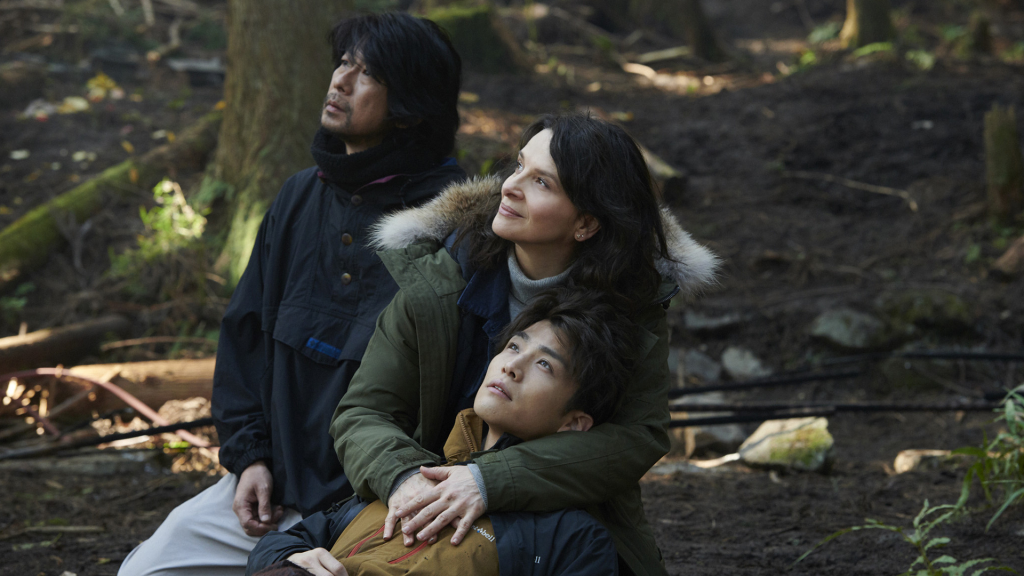
Vision
Dir. Naomi Kawase, 2018, 110 min. With Juliette Binoche, Masatoshi Nagase, Takanori Iwata.
A fabled herb powerful enough to cure all sufferings of the human spirit draws a French journalist (Juliette Binoche) to the fog-enshrouded forests of Nara Prefecture. During her search within the lush landscape she meets several keepers of the forest: Tomo, and his blind senior Aki, who has begun sensing unusual shifts in the environment. As the herb’s once-in-a-millennium return approaches, Aki suddenly disappears—leaving Jeanne and Tomo to navigate increasing disturbances in their surroundings. Vision, true to its title, shines for Kawase’s powerful haptic visuality, as well as the modes of extralinguistic communication it affords her quietly focused characters in the film’s moving contemplation of human existence.
Online only. Available to stream in the U.S.
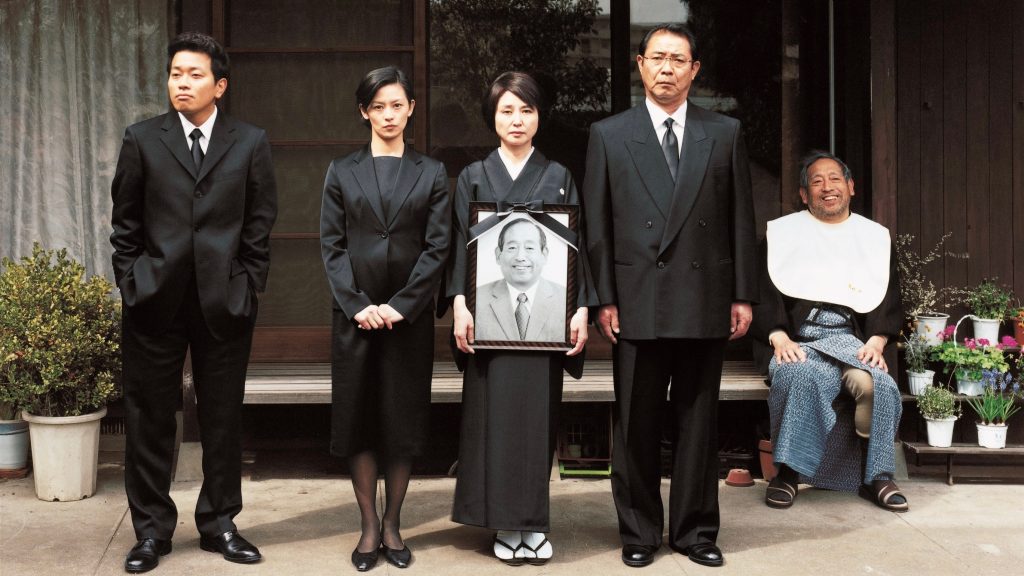
Films by Miwa Nishikawa
Wild Berries
Dir. Miwa Nishikawa, 2003, 108 min. With Hiroyuki Miyasako, Miho Tsumiki, Sei Hiraizumi.
Produced by Hirokazu Kore-eda, the first feature from Miwa Nishikawa (who previously worked on Kore-eda’s Afterlife and Distance) wryly paints a bleakly cynical portrait of the Akechis, a dysfunctional family hiding behind a thin veil of normalcy and traditional values. Comically grotesque and dark, Nishikawa’s debut spends no time splitting hairs to construct a revealing snapshot of a family on the precipice of disintegration: a father who cannot admit to his family that he’s been out of work for years; a dutiful mother burdened by caretaking her senile father-in-law; an idealistic schoolteacher daughter engaged to be married; and a good-for-nothing son whose streetwise talents shine in his profession of con artist. When father Yoshiro’s debts are publicly revealed—causing scandal among neighbors and relatives—the family plunges headfirst into crisis, desperately attempting to stave off further misfortune as their worlds fall apart. Online only. Available to stream in the U.S.
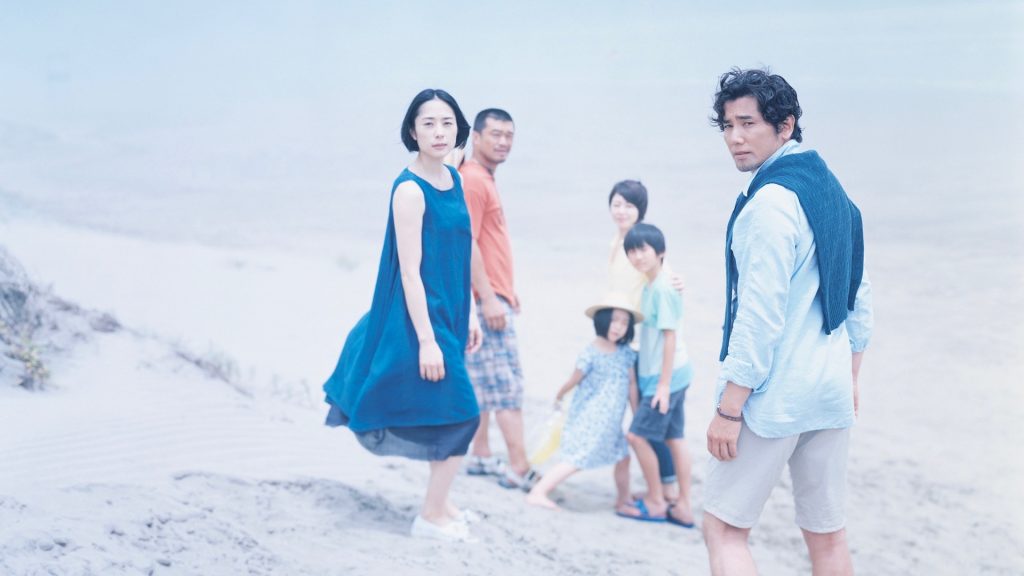
The Long Excuse
Dir. Miwa Nishikawa, 2016, 124 min. With Masahiro Motoki, Pistol Takehara, Eri Fukatsu.
Popular novelist Sachio (Masahiro Motoki, Fancy Dance) is discontent and jaded after years of success; his 20-year marriage is lifeless and loveless while his own indiscretions have led to adultery. When his wife Natsuko and her best friend Yuki suddenly die in a freak accident, Sachio finds that he must act the part of bereaved husband despite a resounding apathy. By chance, he meets Yuki’s devastated husband Yoichi and their two children. Struck by the family’s sincerity and openness, Sachio decides, on a whim, to help care for the children while Yoichi is at work. As Sachio’s fondness for them grows, feelings that he thought were long gone begin to resurface. An adaptation of Nishikawa’s novel of the same name, The Long Excuse is a remarkably moving character study, relentlessly confronting the emotional turbulence of grief, mourning and regret in the aftermath of loss. Online only. Available to stream in the U.S.
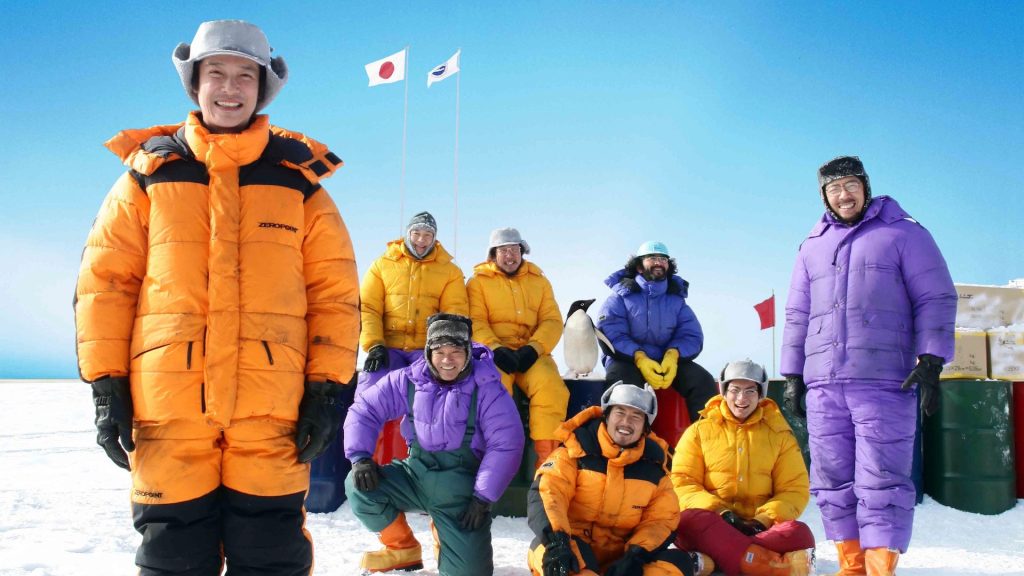
Films by Shuichi Okita
The Chef of South Polar
Dir. Shuichi Okita, 2009, 125 min. With Masato Sakai, Katsuhisa Namase, Kengo Kora.
Passionate cook Jun Nishimura (Masato Sakai) leaves his family behind to join an eclectic team of eight Antarctic researchers at the Dome Fuji Station for a year and half. Tasked with cooking for the crew, Nishimura lovingly prepares elaborate dishes and hearty meals, providing warmth and comfort amid the frigid Antarctic temperatures. Not knowing what the next day may bring, the crew encounters an abundance of both major and minor crises including ramen shortages, relationship issues, loneliness and homesickness. Okita’s quirky humor and lighthearted tone bring heart to this true tale of camaraderie as the crew tries to make a home for itself in the most inhospitable regions of the polar south. Online only. Available to stream in North America.
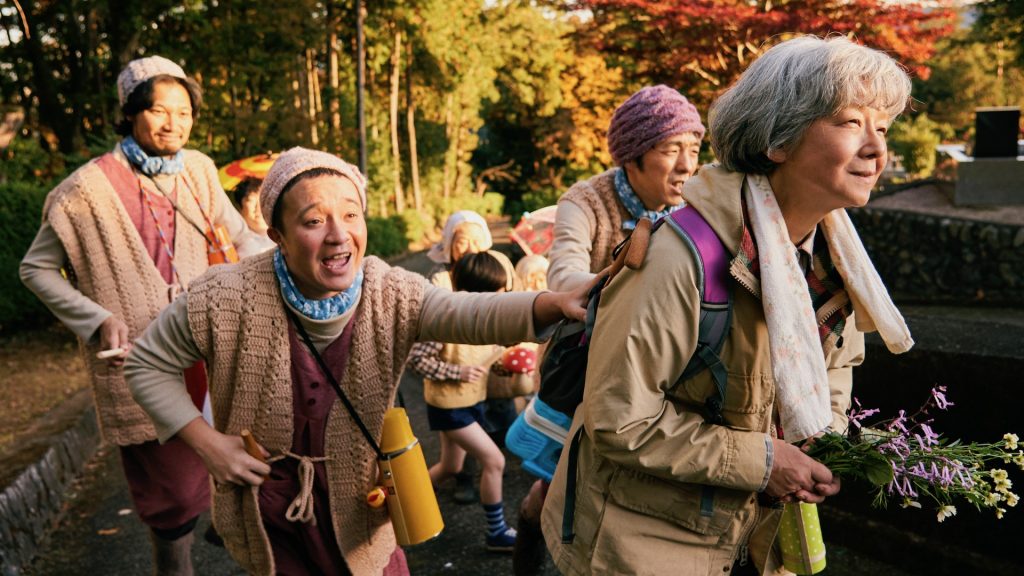
Ora, Ora Be Goin’ Alone
Dir. Shuichi Okita, 2020, 137 min. With Yuko Tanaka, Yu Aoi, Masahiro Higashide.
Seventy-five-year-old Momoko (Yuko Tanaka) lives a solitary existence, residing in a large, empty house after the death of her husband. With each day blending into the next, Momoko’s loneliness manifests itself in peculiar ways—she starts to have visions of her past, accompanied by the sudden appearance of three imaginary men named Ora (meaning “I” in her native Tohoku dialect). Okita’s offbeat surrealism playfully dips between past and present as Momoko reaches back to her younger years for comfort—from her initial arrival to Tokyo as a runaway (played by Yu Aoi) to falling in love—resulting in the resurgence of unfulfilled dreams, regrets and doubts. A contemplative and whimsical meditation on a long-lived life, Ora, Ora Be Goin’ Alone is a gentle and mature exploration of loneliness that skillfully brings comedy and humor to its melancholic subject matter. Online only. Available to stream in North America.

Films by Junji Sakamoto
Knockout
Dir. Junji Sakamoto, 1989, 110 min. With Hidekazu Akai, Haruko Sagara, Akaji Maro, Yoshio Harada.
After narrowly surviving a traumatic brain injury, macho pro boxer Eiji Adachi (Hidekazu Akai) puts his life on the line for another chance at boxing glory—vying for a comeback despite the seriousness of his condition. A hyper-masculine brute with a devil-may-care attitude, the hot-tempered Adachi starts again from the ground up, launching his own Osaka training gym with the hopes of returning to the ring. At times comically absurd, Sakamoto’s film brings a satirical yet bleak approach to the self-destructive nature of the boxer, further bolstered by the very fact that the film is based on the life and career of lead actor Akai himself. A bittersweet tale of resilience and hardship, Knockout proved to be a word-of-mouth hit, garnering widespread popularity upon release, and has since cemented itself as one of the landmark debuts of the ’80s. Online only. Available to stream in North America.
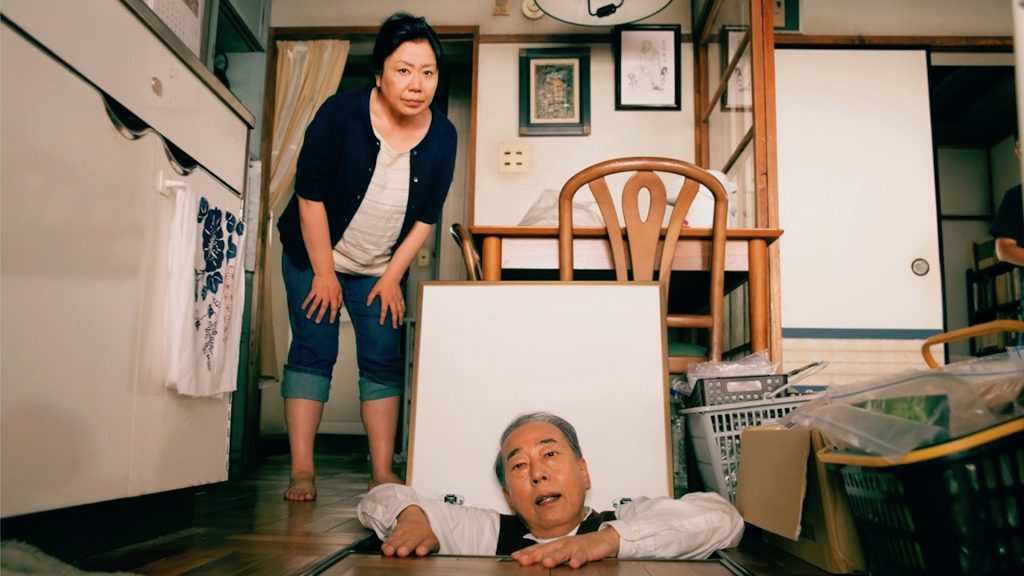
The Projects
Dir. Junji Sakamoto, 2016, 103 min. With Naomi Fujiyama, Ittoku Kishibe.
Whether it’s someone mixing burnables and recyclables or noise from a neighbor’s domestic spat, there’s always something annoying the residents of a housing project in the suburbs of Osaka. However Hinako (Naomi Fujiyama) and Seiji (Ittoku Kishibe) couldn’t care less. Having moved in just six months ago after the closure of their herbal medicine shop, the old couple is reluctantly putting their life back together. But when Seiji disappears, the apartment rumor mill churns: divorce, murder, dismemberment? As the story spins out of control, and a mysterious man with a parasol puts in a tall order of natural remedies, the truth turns out to be even more fantastic than gossip. Melding into a surprising mix of genres, The Projects ranges from an incisive comedy of errors to absurdist adventure and even a moving late-life romance. Online only. Available to stream in the U.S. and Canada.

Films by Akihiko Shiota
Moonlight Whispers
Dir. Akihiko Shiota, 1999, 97 min. With Kenji Mizuhashi, Tsugumi, Kota Kusano.
One of two films directed by Akihiko Shiota in 1999 (the other is the equally arresting Don’t Look Back), Moonlight Whispers is a lacerating take on the youth film—taboo-breaking and startling in its depiction of unconditional love. Seventeen-year-old Takuya and Satsuki are kendo sparring partners who spend the better part of their early mornings training together. Developing schoolyard crushes, their meek friendship blossoms into innocent romance when they confess their affection for each other. But in the early dawning of this budding love, a growing listlessness manifests within Takuya when his perverse tendencies come to light—spiraling the relationship into unknown territory. A warped vision of first love, as awakening desires, thoughts and feelings begin to take hold, Shiota’s shocking and divisive debut has since found acclaim among a wide array of audiences including Leslie Caron and novelist Risa Wataya (Tremble All You Want). Online only. Available to stream in North America.
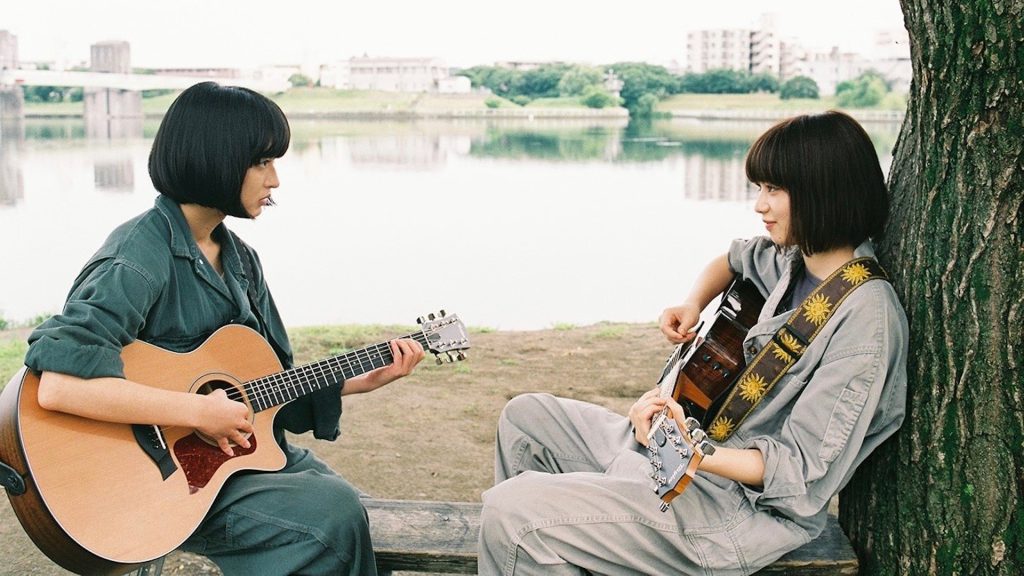
Farewell Song
Dir. Akihiko Shiota, 2019, 116 min. With Mugi Kadowaki, Nana Komatsu, Ryo Narita.
Popular indie folk duo Haruleo—a portmanteau of singers Haru (Mugi Kadowaki, Aristocrats) and Leo (Nana Komatsu) embark on a seven-date tour as one final hurrah before officially disbanding. Barely on speaking terms, the pair take on the passive Shima (Ryo Narita) as a roadie in their employ to help soothe the tension and keep the band from falling apart. The strained relationship and history between once-close friends is slowly unveiled throughout endless highways, gas stations, diners and rest stops as Shiota intersperses glimpses of the past with the minutiae of the tour. Travelling ever closer to their final destination, the trio must come to terms with their eventual break-up and final farewell.
Online only. Available to stream in North America.
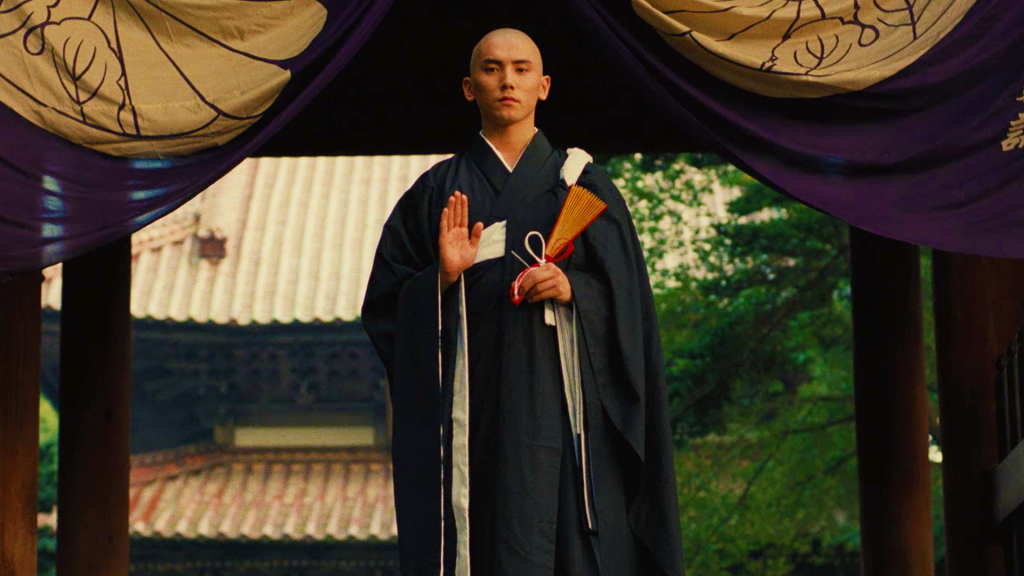
Films by Masayuki Suo
Fancy Dance
Dir. Masayuki Suo, 1989, 101 min. With Masahiro Motoki, Honami Suzuki, Hiromasa Taguchi, Naoto Takenaka.
Descended from a long lineage of Buddhist priests, young punk rocker Yohei (Masahiro Motoki) finds himself obligated to carry on the family name—shaving his (already half-shaven) head, bidding adieu to girlfriend Masoho (Honami Suzuki) and trading in his mod suits for monastic robes—as he reluctantly joins a Zen temple to train as a novitiate for one year. Relocating to a remote mountainside temple where the day-to-day activities include a range of ascetic practices, rites and observances, Yohei’s outward rejection of authority and mischievous ways land him in hot water with the high-ranking monks. Despite all, Yohei soon finds himself taken with the Buddhist way of life, and must face a decision on whether he should remain a monk or return to his anarchic roots. An entertaining, humorous and farcical approach to the puritanical lifestyle, Fancy Dance served as Masayuki Suo’s mainstream debut after the release of his hour-long Ozu pinku satire, Abnormal Family (1984). Online only. Available to stream in North America.
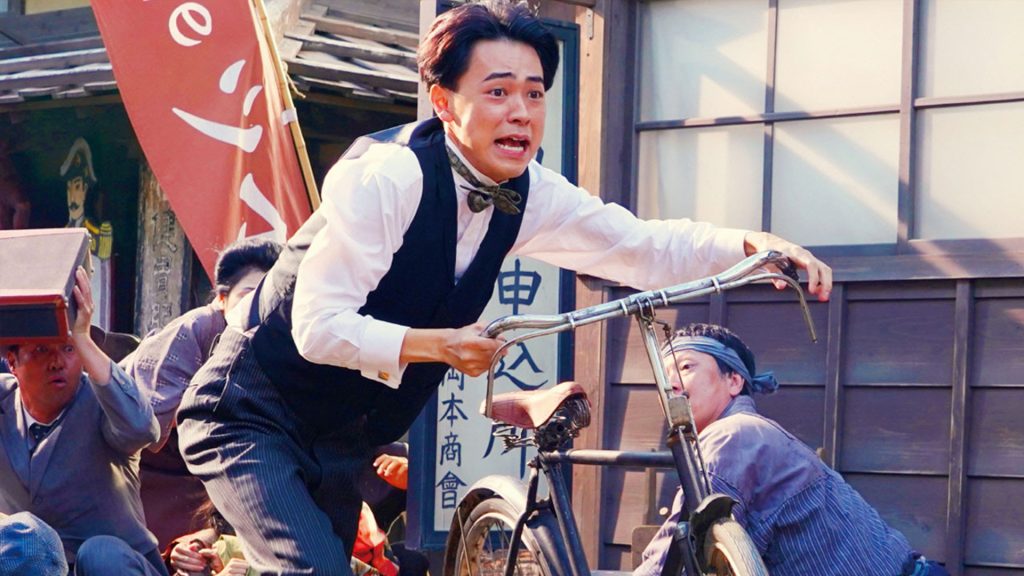
Talking the Pictures
Dir. Masayuki Suo, 2019, 126 min. With Ryo Narita, Yuina Kuroshima, Masatoshi Nagase, Kengo Kora.
The latest film by celebrated director Masayuki Suo (Shall We Dance?) is set in the last days of Japan’s silent movie era, when the real stars were not the actors on screen but live narrators known as benshi who dictated the action, voiced characters and transported audiences into the world of moving images. Hiding from the law in a small town cinema after a burglary gone wrong, lifelong cinephile Shuntaro (Ryo Narita) seeks to change his ways and fulfill his childhood dream of being a star benshi—but before long, a cocky rival performer, a gang of criminals and a relentless detective threaten to undo everything. Filled with charming period details and visual gags, Talking the Pictures is a genuine love letter to Japan’s golden age of silent cinema and a tribute to the magic of moviegoing. Online only. Available to stream in North America.
FOCUS ON SADAO YAMANAKA
In collaboration with National Film Archive of Japan
Films listed alphabetically by title. In-person only.
Priest of Darkness (4K Restoration), International Premiere
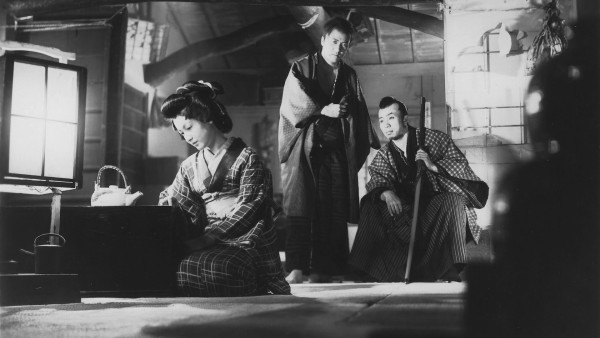
Dir. Sadao Yamanaka, 1936, 82 min. With Chojuro Kawarasaki, Kan’emon Nakamura, Setsuko Hara.
Based on the classic kabuki play Kochiyama & Naozamurai, Yamanaka’s Priest of Darkness is an intricately-plotted jidaigeki set in the streets of an impoverished Tokyo district. Troublemaker Hiro frequently gambles and finds himself embroiled in a prickly ordeal when he steals a samurai’s knife—setting in motion a domino-effect of bad fortune. The quick-witted Hiro hides out under the name of Nao at the tavern of good-willed Kochiyama Soshun, the titular “priest”—a man who dresses in monastic garb and runs the local gambling den. All the while, Hiro’s sister, the beautiful Onami (played by a young Setsuko Hara in one of her earliest roles), desperately searches for him and finds favor with Kochiyama, who promises to find her brother for her. In-person only.
Friday, December 17 at 7:00pm
Tange Sazen and the Pot Worth a Million Ryo (4K Restoration—Longest Version), North American Premiere
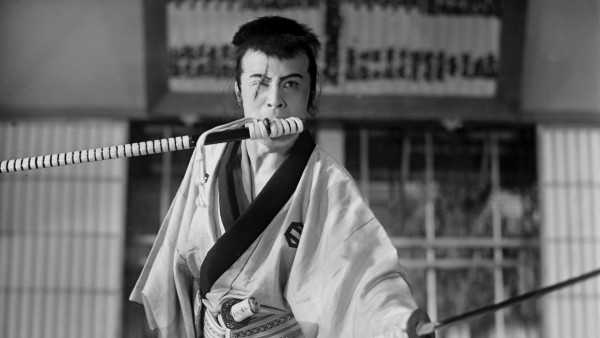
Dir. Sadao Yamanaka, 1935, 94 min. With Denjiro Okochi, Kiyozo, Kunitaro Sawamura.
Through a series of mishaps, an ugly pot containing a secret map to the prominent Yagyu family’s hidden million ryo fortune is gifted away, passed unwittingly from owner to owner as the lord scrambles to regain possession. As word spreads through the land, the sought-after pot unknowingly lands in the hands of a small child, Yasu, who uses it to keep his goldfish. But when Yasu’s father dies, he’s taken under the care of a local tavern guarded by the gruff, one-armed, one-eyed ronin, Tange Sazen. As luck would have it, the lord’s brother, Genzaburo, begins to frequent the very same tavern… In-person only.
Saturday, December 11 at 7:00pm
FILMMAKERS ON THE RISE
Films listed alphabetically by title. All films are free to stream. Online only.
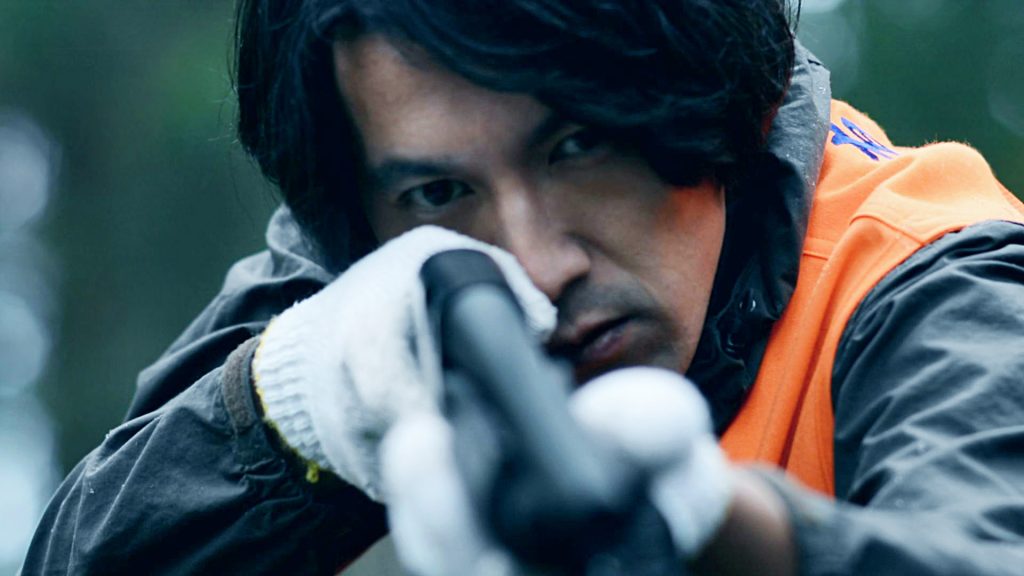
The Albino’s Trees
Dir. Masakazu Kaneko, 2016, 86 min. With Ryohei Matsuoka, Kanako Higashi, Yusuke Fukuchi.
A poignant moral dilemma unfolding against lush mountainous landscapes, The Albino’s Trees follows Yuku (Ryohei Matsuoka), an animal control hunter who takes on a lucrative job to kill a rare white deer considered to be a god of the forest by a nearby village. Though Yuku initially steps up to the task in order to support his mother’s medical bills, his will begins to falter as he gets to know the villagers and the reasons behind their difficult choice to live as outsiders. Director Masakazu Kaneko renders these nuanced relationships with a measured pace and subtle touch, and the film’s panoramic vistas mix with tender close-ups of bodies in nature to probe some of the film’s biggest questions about what it means to act and live within the matrix of personal obligations, conformity to modern life and the larger rhythms of nature that bear quiet witness to human decisions. Online only. Available to stream in North America.
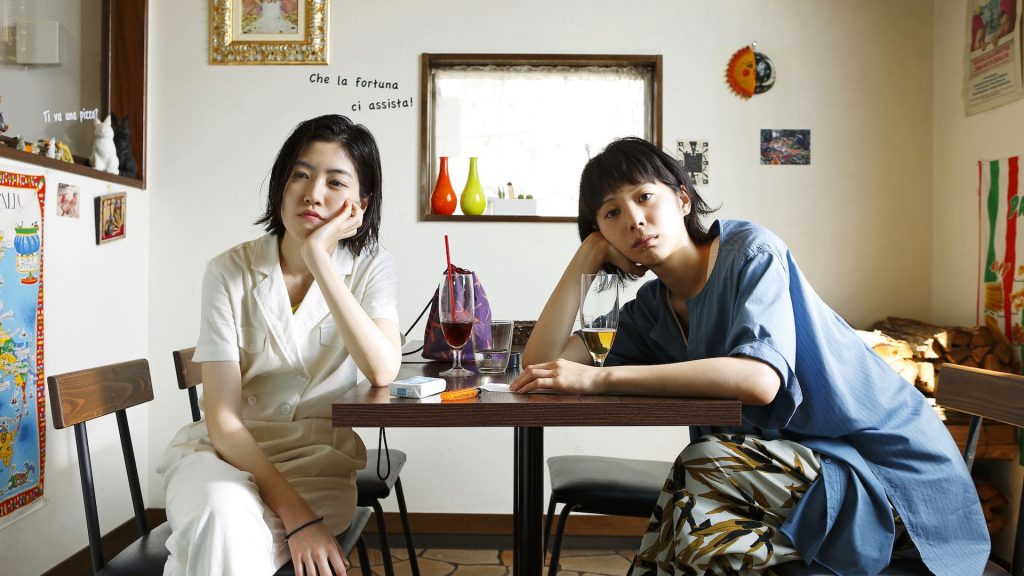
Blue Hour
Dir. by Yuko Hakota, 2019, 92 min. With Kaho, Eun-Kyung Shim, Denden.
Just past 30, Sunada (Kaho) is a consummate Tokyo entertainment media professional (with the toxic love life and battered liver to prove it), directing television commercials that require more personality management skills than artistry. Discouraged by the inequitable pressures of a misogynist industry and her cycle of self-destructive behavior, Sunada road trips to her rural Ibaraki hometown with her free-spirited best friend Kiyoura (Eun-kyung Shim), where she reopens uneasy family relationships and unlocks repressed creative spirits. Director Yuko Hakota manages subtle fluctuations of reality with distinct comedic flair in this remarkable debut, announcing the arrival of a new force in Japanese cinema. Online only. Available to stream in North America.
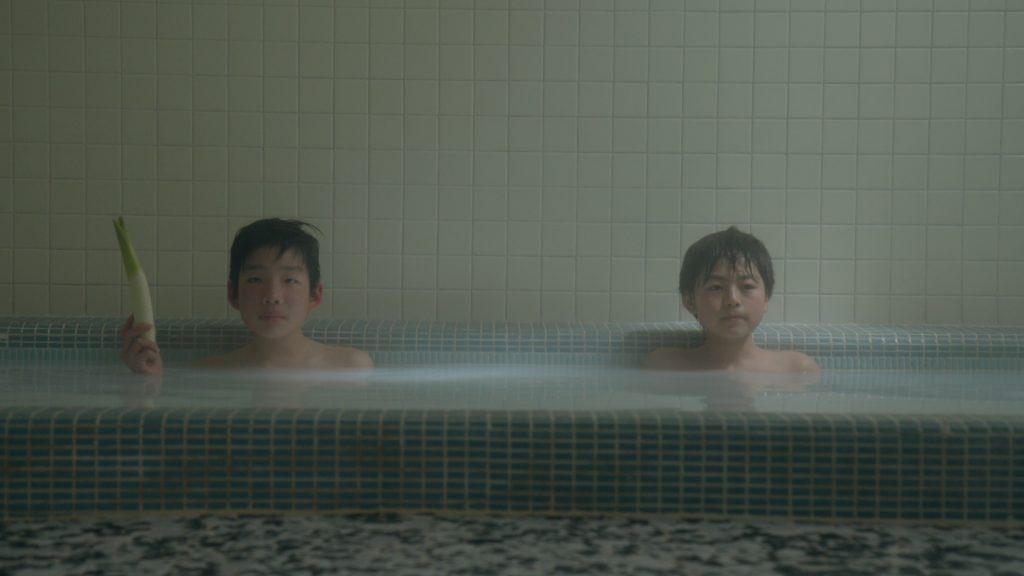
A Boy Sato
Dir. Omoi Sasaki, 2017, 15 min. With Kazuma Ichioka, Yuya Hijikata, Ryosuke Nishino.
Set in a mountainous hot spring town, the sci-fi inflected A Boy Sato focuses on the sudden reappearance of the eponymous Sato, a strange outsider, who greets his old friend Hijikata one day outside the local train station. Visiting former hangout spots and local attractions, Sato begins to sense that something is not quite right in the town. Online only. Available to stream in North America.
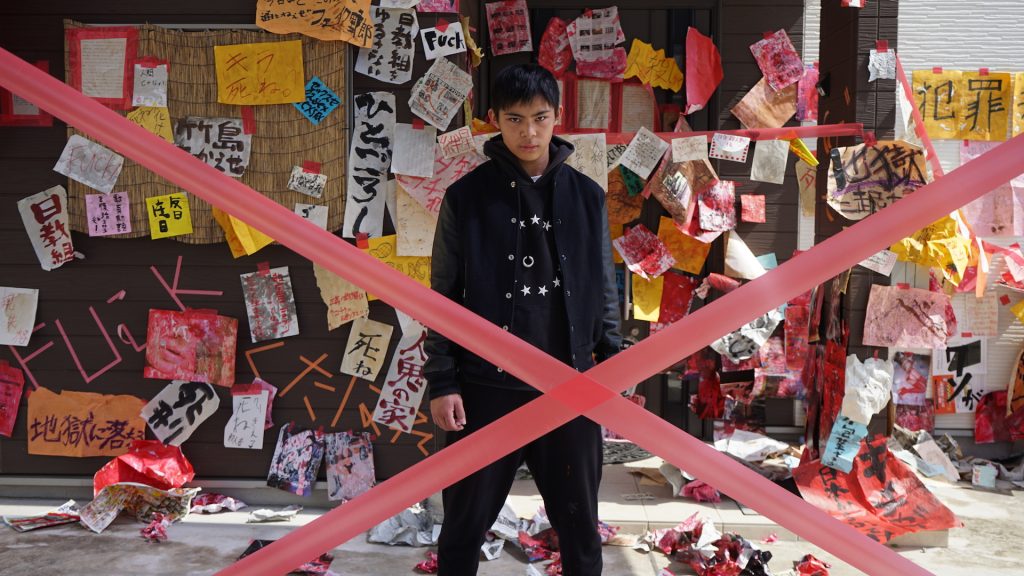
Forgiven Children
Dir. Eisuke Naito, 2020, 131 min. With Yu Uemura, Yoshi Kuroiwa, Yukino Nagura.
Thirteen-year-old Kira and his friends regularly torment their classmate, Itsuki, but one day Kira takes things too far—shooting an arrow from a makeshift crossbow into Itsuki’s throat. As Itsuki bleeds out, Kira and his friends flee the scene, but when Kira is interviewed by police, he confesses. As the object of rabid social media attention—even being doxxed online—Kira is found “not guilty” by juvenile court to everyone’s dismay. But the constant attention on Kira and his family never relents as cries for justice escalate into xenophobic hate, social media harassment, and more. A raw and unsettling account of teen bullying and delinquency, Forgiven Children takes inspiration from real-life juvenile cases in Japan, presenting an unfiltered view on the Japanese juvenile system, the ruthless cycle perpetrated by bullying, and conflicting questions of ethics and morality. Online only. Available to stream in North America

My Atomic Aunt
Dir. Kyoko Miyake, 2013, 73 min.
After spending 10 years abroad, director Kyoko Miyake returns home to Japan to visit Namie, the sleepy coastal town of her youth, in the wake of 3/11. With its close proximity to the Fukushima plant, Namie has since become a forbidden zone—displacing Miyake’s elderly Aunt Kumiko who clings to the hope that one day she may return. As younger generations move on and leave the region, Miyake documents her aunt’s struggles with adjusting to life outside of her beloved Namie. Exploring her family history, Miyake uncovers the town’s complicated and conflicting history with nuclear power—constructing a heartbreaking eulogy for a community that now remains only in memory. Online only. Available to stream in North America.
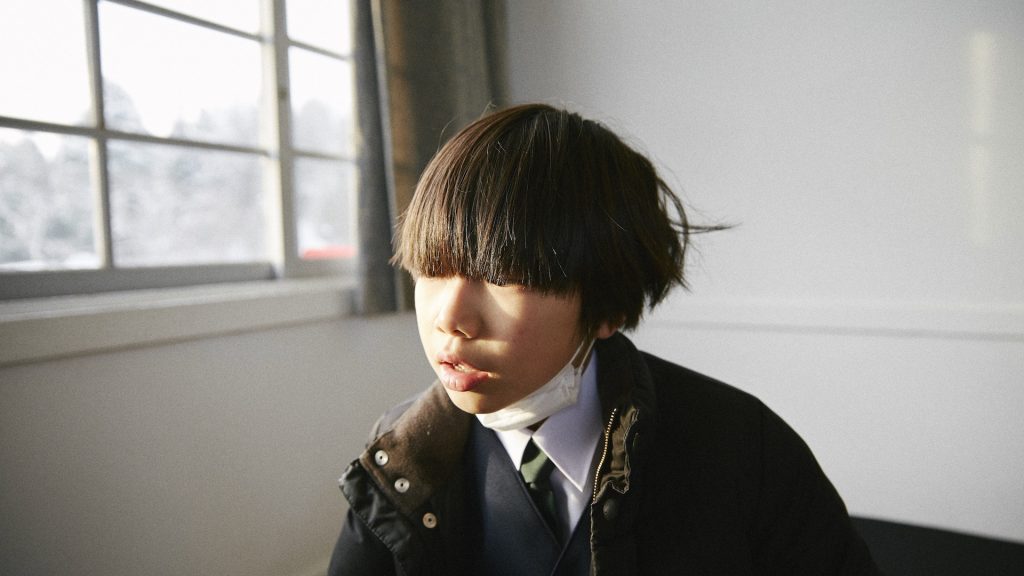
Jesus
Dir. Hiroshi Okuyama, 2019, 76 min. With Yura Sato, Riki Ookuma, Chad Mullane, Hinako Saeki.
A quiet boy named Yura moves with his family from Tokyo to the snowy Japanese countryside where he is enrolled in a Christian elementary school. Adjusting to the foreign religious rituals and iconography surrounding him, Yura tries Christian prayer for the first time and a silent six-inch Jesus materializes before him. The tiny Christ seems to grant Yura’s wishes, but when tragedy strikes, Yura starts to question his newfound faith. Winner of the New Directors Award at the 2019 San Sebastian International Film Festival, 22-year-old director Hiroshi Okuyama imbues wry humor, mystery and a childlike perspective in this highly original, oddball debut.
TALKS
Listed alphabetically by title. All talks are free to stream worldwide and will be available at film.japansociety.org starting Dec. 3.
Flash Forward: Conversations with the Filmmakers
Directors Naomi Kawase, Miwa Nishikawa, Shuichi Okita, Junji Sakamoto, Akihiko Shiota and Masayuki Suo reflect on their filmmaking debuts and the changes in the filmmaking process and industry since their early careers.\
Panel Discussion: Debut Works and Beyond
In this unique conversation moderated by Aaron Gerow, panelists Takuya Tsunoda, Junko Yamazaki and Jasper Sharp discuss the six Flash Forward directors and their films while also delving into the cultural background and film industry at the time of each director’s debut.
Moderator: Aaron Gerow
Chair and Professor of East Asian Languages and Literatures & Professor of Film Studies and East Asian Languages & Literatures, Yale University
Panelists: Takuya Tsunoda
Assistant Professor of Japanese Film and Media, Columbia University
Junko Yamazaki
Assistant professor, Department of Asian Languages and Cultures, UCLA
Jasper Sharp
Writer, Curator and Filmmaker, Arrow Films

